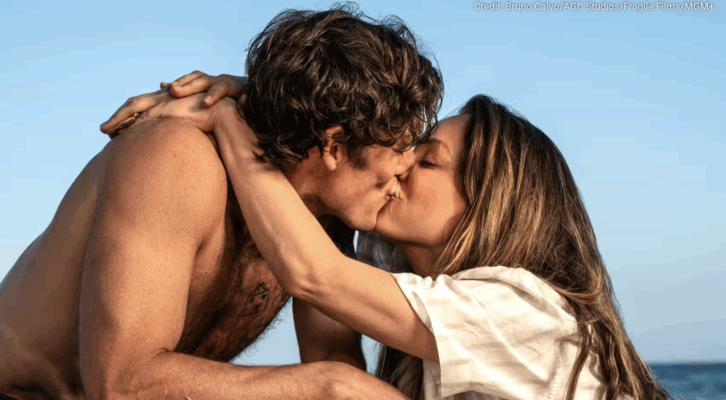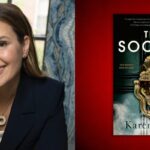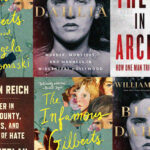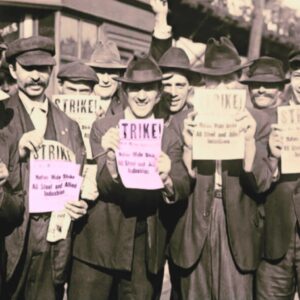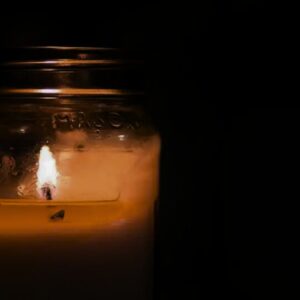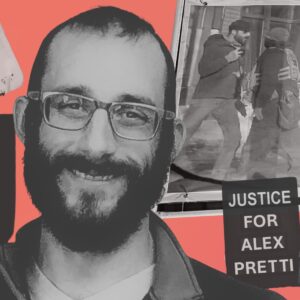
Mary Gaitskill: I Have Nothing Rational to Say About What's Happening Now
On her 'flexible' marriage, alternative motherhoods, and Donald Trump
It’s a Saturday afternoon, the week before Donald Trump’s inauguration, and Mary Gaitskill and I are way off topic. We’re supposed to be discussing her forthcoming book of essays, Somebody With a Little Hammer, but we can’t seem to drag our attention away from politics. Like many of us, Gaitskill woke up on November 9th afraid. The fear she felt was unlike anything she had experienced before in the context of an election. “I was in Pittsburgh at the time,” she tells me. “And I would be walking down the street sometimes looking at the people around me, thinking ‘did you…were you one of them?’ and I felt they were looking at me the same way.” I’m nodding at Gaitskill furiously over Skype, relieved to know that, at least in this one way, she’s just like me at this moment in time: afraid, suspicious, vulnerable.
But, unlike many of us, Gaitskill says she saw this coming. In “Worshipping the Overcoat: An Election Diary,” published in Liberation in 2008 and forthcoming in this new collection, Gaitskill wrote that Hillary Clinton could never win “because she’s not enough of a cunt.” This was in 2008, when Hillary was running against Obama in the primaries, but Gaitskill says it was still true in 2016.
“I didn’t mean that she’s not enough of a bitch,” Gaitskill says. “I mean that she doesn’t have a strong, visceral, physical presence. Trump has that. I don’t like it, but he does have that.” She supported Hillary and voted for her, but says she was worried all along about her chances. A Bernie supporter during the primary race, Gaitskill believes Bernie could have provided a “strong counterweight” to Trump. And months ago, it would have been my instinct here to roll my eyes: the ‘Bernie would have won’ crowd were among the least necessary or helpful voices on the left in the wake of Trump’s shock victory, but now it’s difficult to disagree with Gaitskill. The post-election rise in popularity of groups like the Democratic Socialists, who offer a Bernie-style populist message to a frightened and alienated left, is proof that Americans might be more interested in socialism than anyone believed.
Gaitskill and I have never met or spoken before, but the political moment immediately connects us. She keeps saying things that describe how I’ve been feeling: she too has been obsessively refreshing web pages, equally dreading and desperate for the next piece of news. She too, in these final weeks before power changes hands, has been hoping that something huge will happen to stop Trump’s White House takeover. She too has begun to resign herself to the fact that nothing is going to prevent the inevitable, and is trying to tune out more often in the interest of preserving her sanity.
She sits at her desk in her apartment in Williamsburg, straight-backed, dressed in a comfortable-looking cardigan and with her hair loose around her face. She’s strikingly youthful. Her silvery paleness brightens my computer screen. Later in our conversation, Gaitskill will remark that young women are often the most impressed when an older woman looks good, and I’ll think of this moment. I’ll think, guilty. I am impressed too by her thoughts—they’re never quite what you expect—and how she articulates them; she speaks seriously and generously, choosing her words with great care. She speaks at length about topics that clearly provoke something in her—anger, disbelief, love, compassion. I sit at my desk in Virginia equally Saturday-dressed—a black sweater for the camera and pajama pants under the desk, where I don’t have to pretend. As I’m checking myself on camera before Gaitskill calls, I recall how the writer Emily Nussbaum once prepared to meet Mary Gaitskill—by removing her engagement ring. She thought the literary queen of kink, purveyor of such feminist classics as Bad Behavior, might be disdainful of such “a bourgeois display.” Nussbaum arrived to meet Gaitskill bare-fingered only to find the writer sporting an impressively ostentatious rock of her own. I think, as I recall this, to ask Gaitskill about marriage, about this prevailing image of her as a proudly independent feminist, the idea that she of all people wouldn’t stoop to needs so pedestrian as love and companionship. But I keep that for later. For now, we really must get to the new book.
Mary Gaitskill primarily writes fiction. Her body of work is full of women on the fringes—of sanity, of danger, of sexual acceptability. (That prevailing image exists for a reason.) Her characters are strange, daring, explicit and dark. Gaitskill finds fiction to be “an intuitive process,” but non-fiction? Not so much.
“I have an idea of what I want to do when I sit down to write a story or a novel, but it comes from a dreamy place that I can’t really put my finger on or explain very easily. Non-fiction is a much more rational process,” she says.
The new book, which collects for the first time critical and personal writing dating as far back as 1994, contains Gaitskill’s opinions on a wide range of topics, from date rape to the Talking Heads album Remain in Light, from Gone Girl to Dickens. She writes about the Hollywood adaptation of her short story “Secretary” (the fluffy ending wasn’t faithful to the story’s darkness, she says). She writes about her own rape with admirable and heartbreaking clarity. She writes about her marriage, her family and her relationships with the children in her life. How does she think the work will be received in comparison to her novels and short stories? “A friend of mine,” she says, “thinks people will find the essays far easier to deal with or to respond to because, as he put it, ‘your fiction has a kind of emotional nakedness which the essays do not. The essays are wearing a dress.’ And I’m like, yeah, but it is an old dress. They were written during very different times than the ones we’re living in.”
Case in point: the aforementioned “Election Diary” essay, whose hopeful tone is now, eight years later, heartbreaking to read. The piece closes: “He [Obama] has incredible courage to be where he is, up against that old bastard [McCain], especially if he got there without full confidence. My sister believes he can win. I hope she is right.”
“Yeah, I felt sad, reading that,” says Gaitskill. “It seems like all the things we thought were the worst thing possible are now so much worse. Sarah Palin looks like a more harmless kind of cartoon character in comparison to what’s happening now.”
These essays may be wearing an old dress, but it’s a timeless one, the kind that gets passed down. There’s a certain pathos implicit in her more political essays precisely because we are reading them at a time when we need hope badly. And despite Gaitskill’s often forthright cynicism and sharp critical eye, there is hope to be found here. The joy that Gaitskill finds in literature and music is all over these pages—she riffs on Chekov’s “Gooseberries,” Dickens’s Bleak House, Gogol’s “The Overcoat,” her love of a Bjork song. But I wonder, does she feel a certain pressure now to write essays that directly address our current political moment?
“Not right now,” she says. “I’m not primarily an essayist. The next thing I need to do is write a novel. I want in that novel to address some of these things, but it’s a more capacious thing in a novel. You don’t have to approach it from a place of rational opinion. I started a novel intending for it to be about the world of New York leading up to 9/11 and the aftermath, but what’s happened since then is so much hairier. 9/11 was a terrible thing, but to me this is about a thousand times more frightening. That’s kind of the direction I’m thinking in now [with regard to writing], but frankly I don’t know if I can come up with anything rational to say about what’s happening now. It’s insane to me. It’s so big, I don’t even know where to start.”
We manage to steer ourselves away from political despair for a time in order to talk about some of Gaitskill’s more personal essays. The emotional centerpiece of this book is “Lost Cat,” which originally appeared in Granta in 2009 and covers some of the same material as Gaitskill’s most recent novel, The Mare. Though, of course, the stuff in “Lost Cat” is real, while The Mare is fiction, she says. “Lost Cat,” at almost 40 pages, is the longest essay in the book, and in some ways the most personal. It recounts a period in Gaitskill’s life when she, yes, lost her beloved pet cat Gattino, but also a time when she was experiencing loss in various forms. Around that time, two children came into her life through the Fresh Air Fund, which sends inner-city kids to host families in the countryside each summer. Here is the premise you might recognize from The Mare. Soon, a bond formed between the children and Gaitskill and her husband Peter, a bond which Gaitskill cites as one of the most important of her life. The way she talks about it, it’s like a mother talking about her own children. “It was surprising, the intensity of the feeling,” she says. As the essay describes, the couple hosted Cesar and another boy named Ezekial in the first summer of their involvement with the Fresh Air Fund. “The little boy I called Cesar, I remember, when we met him he was six, very shy and gentle. He and the other boy did not get along with each other and they were fighting so much we had to intervene. I took Cesar out, I asked him if he wanted to go see some cows and I took him out there and I parked the car and we got out of the car and he just very naturally reached for my hand. It was such a trusting gesture that I was so moved, it was almost a physical feeling.” Later, when they sat down to dinner together, Cesar needed some help with cutting his food and, Gaitskill says, “he looked up at me with such a sweet face that it was a physical feeling in my heart that I had never felt before. It was very powerful.”
Gaitskill doesn’t have biological children of her own. “I don’t think everybody is meant to be a parent,” she says, with her usual frankness. “And that’s not because there’s anything wrong with them, it’s just not part of their fate in life.” I ask her then: does she think that what she experienced with these children was a form of motherhood?
“I don’t think I experienced it fully. However strongly I felt about these kids, they didn’t come out of my body. I can tell you though that a loving relationship between an adult and a child is very different from any relationship you’ll have with [another] adult. It’s just not the same. It’s very different, it’s very profound. Kids, their presence, and interacting with them helped me so much. I really hope I did half for them what they did for me.” She’s still in touch with both children, who are grown now, and she tells me about Cesar’s recent job training and her concerns for his gentle, artistic side, which she’s worried won’t get a chance to bloom. “He’s not going to go to college unless somebody is going to pay for it and make it happen, and I can’t at the moment,” she says. “Even if I could, I don’t know if college would actually be the best training for him or if he would qualify to get in with grades. Or, even more importantly, whether he would have the desire for it or believe he could do it.” She’s conscious of not prescribing her own hopes and dreams onto Cesar, but clearly feels passionately about his future. “Right out of high school he was shunted into trained labor programs and while there’s nothing wrong with that, I truly don’t think it suits him. It does some people. Not him.”
I eventually get around to asking her about marriage. Her husband, the writer Peter Trachtenburg, crops up in some of the more personal or memoiristic pieces in the book. His presence is peripheral but warm. My husband, she says, with affection. In the essay “The Bridge: A Memoir of St. Petersburg,” which appeared in Zoetrope in 2004, Trachtenburg appears as a supportive and jovial presence, a steadying force on a trip during which Gaitskill hit her head on a low stone bridge during a boat ride and ended up in hospital. I read somewhere that she and her husband had split up some years ago, but she says they’ve recently gotten back together. The romantic in me is delighted—yes, for this couple I’ve never met. I ask, because I’m curious and also because I’m relatively newly married myself: how has marriage been for you? Has it been different than what you expected?
“It’s a far more flexible arrangement, as we’ve experienced it,” she says, laughing a little. “There has to be so much understanding and acceptance on a level than no other relationship will require. I don’t know if I had that much expectation of [marriage] except that it didn’t seem like something you needed to do unless you wanted to raise a family, so I didn’t plan on doing it. But what I’ve learned is that it changes how people see you, much more than I realized. It changes how people respond to you. People are more secure around you if you’re married. I don’t know why, it’s like you’re a loose cannon if you’re single.” Has she noticed attitudes shifting again since getting back together with Peter? “Now that I’m an identifiable unit again, there’s a level of comfort. I don’t think it’s my imagination, people feel more comfortable with me this way.”
She gives no indication, of course, that she wants anyone to feel comfortable around her, or that she cares what her relationship status does to ease the worries of the people she meets. She shrugs; her face gives nothing away. This is Mary Gaitskill: noticing behaviors, filing them away, articulating them with perfect clarity.
*
It’s Donald Trump’s first week in office. In the midst of marching with millions of others worldwide, calling elected representatives, fuming on Twitter, and the occasional bout of complete despair, I’m working. I teach, I write. Gaitskill and I exchange some emails. This time, in the wake of the Women’s March, we’re thrilling on the buzz of this newfound movement. It’s a moment of joy and solidarity and with it comes hope, the kind we have not felt in months. “How was the march in Washington?” she asks. “The NYC one was pretty great.” She attaches a photo she took on the day. The photo shows a group of three women, naked from the waist up, one with aquamarine hair and her arms raised above her head, her fingers joined in the shape of a heart. Scrawled across this woman’s naked back in black marker are the words “No, I’m not cold, my cunt is too warm.” It strikes me as the perfect Mary Gaitskill photograph. The implicit smirk, the bravery, the fuck you attitude. And there’s that C-word again. Are these girls the “cunts” Gaitskill imagined Hillary would need to be in order to win against Trump? Are women like these protestors the kind of cunts we need in order to fight back against him? Either way, it makes me shiver to look at the picture—but it also makes me smile. There’s a suggestion of a smile from behind the camera, too. From amidst the horror of the present moment come moments like these, small glimpses of hope. And there are large flashes of hope in the form of marches, like those Gaitskill and I and millions of others attended that Saturday in late January.
 Photo: Mary Gaitskill.
Photo: Mary Gaitskill.
Gaitskill tells me that she recently heard Rebecca Solnit speaking on the radio, and took some comfort from what she had to say.
“[She said] we should never give up hope. Even though things are very dark, there are always small ways in which people are working for the good, even though it might not be visible. The interviewer brought up climate change and Solnit said yes, it’s true, it’s very serious but nonetheless, a lot of progress has been made in the last ten years, people produce less, there’s less paper being used, there’s less carbon emissions…I took some comfort from that. I listened to her. Maybe we’ll stumble through somehow.”
I’m nodding, somewhat sadly, trying to smile.
“I don’t mean to be depressing,” Gaitskill says. “Think Rebecca Solnit.” It seems fitting to me that all of the beacons of hope that Gaitskill and I have discussed, from the protestors in the photograph to Rebecca Solnit on NPR, have been women. “I had a male writer, a colleague say to me,” Gaitskill says, almost but not quite rolling her eyes, “‘feminism is great. I love feminism, what it means is that women do all the work.'” But look, there is a lot of work to be done right now, and someone has got to do it—with women like Solnit, Gaitskill, and the millions who marched on January 21st as our guides, that work is well underway.
Feature image: Tabitha Soren
Helen Chandler
Helen Chandler is an Irish writer living in Virginia, where she teaches fiction at UVA. She is the Editor-in-Chief of Meridian magazine and her fiction has been published in The Stinging Fly and The South Circular. She is at work on her first novel.











